One out of 25 drivers have fallen asleep at least once a month while driving as per a study conducted by the CDC. Getting behind the wheels while feeling drowsy is absolutely dangerous and should be avoided under all circumstances. Such kind of driving has resulted in above 72,000 accidents, which include 6,000 fatalities and 44,000 major or minor injuries each year. Car accident lawyers, such as the ones at Riddle and Brantley, have some additional information on these statistics and more on what you can do to avoid becoming one.
Individuals who are at Risk of Driving Accidents resulting from Tiredness
Individuals who drive for long durations uninterrupted can show signs of tiredness and fatigue. Motorists who are prone to fatigue and tiredness while driving include:
- Drivers of commercial vehicle such as trucks, trailers, or buses among others
- Individuals who work night shifts or extra shifts
- Those with sleeping conditions
- People who do not get adequate sleep regularly of at least 8 hours
- People who haven’t slept in more than 18 hours
- Individuals who consume medications that could make them drowsy like anti-anxiety medicines, muscle relaxants, anti-depressants, blood pressure medication, or medication for nausea or diarrhea.
Signs of Driving when Tired
The most commonly experienced signs of driving under fatigue are yawning, rubbing off eyes frequently, nodding off, drowsiness, skipping signals, missing exits, feeling restless, facing difficulty in focusing, loss of concentration, hallucination, drifting, tailgating, and slow response to hazards and obstacles on the road.
It is crucial to understand that dangerous situations can arise even if the driver falls asleep while driving for a split second. If you show such signs of tiredness or drowsiness while driving, it is strongly recommended that you pull over at the nearest rest spot. Nowadays, everyone is always preoccupied with personal lives, work, and stress that can make them exhausted. Driving under such a tired state of the body can prove dangerous for the driver as well as other drivers, passengers, and cars that share the road.
How to Prevent Drowsy Driving
Drivers should follow the below guidelines to prevent the possibility of accidents due to tiredness while driving.
Do Not Drink and Drive: First and foremost, you should not drive if you are intoxicated. If you have consumed even small amounts of alcohol you will most likely feel drowsy.
According to DWI Lawyers, it is best to avoid drinking if you have to drive. This is because, in addition to getting charged for DWI offenses, you can get hurt if you get involved in an accident. The major advice from DWI Lawyers is that in the event that there is a problem, you should immediately work with legal aid as soon as possible. Waiting too long for the same might result in imprisonment charges and other penalties being leveled.
Check the Medical Prescriptions you Consume: Always check your medicines for information on any effects like drowsiness, nausea, and do not such medication before driving. You can always request someone else to drive you or use a taxi service.
Get Adequate Sleep: You should get at least 8 hours of sleep before driving.
Avoid Driving at Peak Sleep Hours: It is advised to skip driving from 12:00 am to 6:00 am and during late afternoons.
How Can a Good Car Accident Lawyer help you?
If in an unfortunate circumstance you have been in a motor vehicle accident that was caused by fatigue, an experienced car accident lawyer can assist you in filing your claims so that you receive fair compensation. You may do everything in your capacity but can still get into a collision. In an event that you have been responsible for an accident since you were driving while being tired, it is imperative to seek comprehensive legal assistance from a seasoned who can assist you in navigating through the lawsuit or negotiate settlements for you.
Read Also:




























